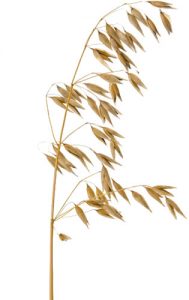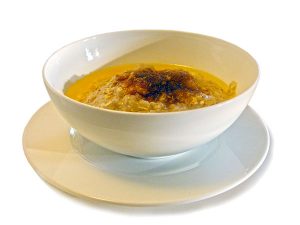We read a lot about superfoods, and sometimes is seems that the more exotic and remote the area from which they come, the greater the healing power attributed to them: berries from the Himalayas, grains from the Andes, seaweed from distant seas…
But do superfoods always have to come from far away? Surely not! For many generations, an extremely versatile and highly effective superfood has been growing in our own local fields: oats.
Although Ayurveda classifies oats as a grain with Kapha-reducing properties, warm oatmeal (in Britain: porridge) is also recommended for balancing excess of Vata and Pitta Dosha.
Of all the common cereals, oats are probably the best and healthiest by far.
In 2017, oats were named
‘Medicinal Plant of the Year’
Oatmeal can lower blood sugar and cholesterol levels, protect intestinal flora and thus prevent cancer.
- More than half of the calories contained in oatmeal comes from high-quality carbohydrates.
- Oatmeal contains 13.5% protein, making it also perfect for building muscle.
- Compared with other cereals, oatmeal contains much more dietary fat: around 6%. This consists almost exclusively of unsaturated fatty acids, which are very healthy for the body.
- Because oatmeal contains about 10% dietary fiber, it is very beneficial for digestion. And in spite of its high calorie content, it is also suitable for dieting, because fiber-rich foods are very satisfying.
- Oatmeal contains the dietary fiber beta-glucan, which has a positive effect on the immune system.
- Oatmeal also contains avenanthramide, a highly effective antioxidant from the group of polyphenols, which, among other things, prevents the oxidation of LDL cholesterol.
Oatmeal is a very versatile food and it provides our body with fiber, numerous valuable minerals, such as vegetable iron, and vitamins:
- Oatmeal is rich in B vitamins, which are important for healthy skin, hair and nails and for the nervous system.
- It is also rich in vitamin K, an essential factor for blood coagulation and the mobilization of vitamin D.
- Oatmeal provides us with essential minerals such as zinc, iron, magnesium, calcium, and manganese.
- Thanks to its high content of beta-glucan, oatmeal can help lower cholesterol levels.
- Oatmeal is a great supplier of silicon, which is important for skin, nails, and hair, and also for bone health.
Oats: a practical superfood
It is generally recommended to consume 40–50g of oatmeal daily, and breakfast is a perfect time for this.
Oatmeal is most easily digestible when boiled with water. The recipe is as follows:
- 40g of oatmeal. (A lightly heaped tablespoon is about 10g).
- 240 ml of water
- a pinch of salt
- 1 tsp of Ghee (clarified butter)
- brown sugar or maple syrup to taste
- a little cinnamon
Bring the oatmeal to a short boil and let it soak for 20 minutes. Then you can heat it up again, pour it into a bowl and add the Ghee, followed by the brown sugar or maple syrup and the cinnamon.
If you want to make the oatmeal richer, you can add almonds and dried fruits (soaked overnight) or fresh, sun-ripened fruit. It’s best not to boil them with the oatmeal, but to add them afterwards.
Enjoy!

Download the article as a PDF file
© Maharishi Ayurveda Privatklinik Bad Ems